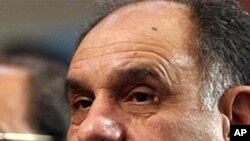Shock, anger and confusion have overtaken Iraq's political class due to expectations that more than 1,000 candidates in the upcoming parliamentary election will be banned for alleged ties to the Ba'ath party. The move further threatens hopes for a smooth election, key to a U.S. withdrawal.
A small Iraqi parliamentary committee is considering which candidates might be excluded from parliamentary elections, due to be held in March. Iraq analysts say more than 1,000 candidates could be banned from the electoral list for ties to the Ba'ath party.
Iraq's electoral commission indicated it needs one more day to publish its final list of candidates to be excluded from the polls. Behind the scenes wrangling over just which names belong on that list appears to have gripped Iraq's political establishment.
The Arab daily Asharqalawsat reports top Sunni politician Saleh al-Mutlaq, as well as Defense Minister Abdel Qader al-Obeidi, are to be banned for alleged ties to former Iraqi leader Saddam Hussein's Ba'ath Party.
Al-Mutlaq had joined up with former prime minister Iyad Allawi to put together a coalition that analysts say had a strong likelihood of defeating the faction that now supports Prime Minister Nouri al-Maliki. Al-Mutlaq is crying foul:
He says the country cannot be built and governed simply on principles [laws] designed to eradicate the Ba'ath Party because this will purge the country of all its vital forces, of which it is in dire need.
The parliamentary committee doing the vetting includes the once prominent political figure Ahmed al-Chalabi, and Falah Shansal, an ally of the pro-Iranian cleric Muqtada Sadr.
Al Baghdadiya TV, a popular Sunni Arab satellite channel, accused the committee of "trying to destroy political reconciliation in the country," and "throw[ing] the election in favor of pro-Iranian Shi'ites."
Iraq's Shi'ite Vice President Adel Abdel Mehdi told Al Hurra TV that he does not think Iraqi Shi'ites are trying to exclude prominent Sunnis from the political process just to weaken them politically:
He says that he does not believe that Iraqi Shi'ites have a political program to exclude Sunnis from governance, but that all of Iraq's political forces should have an equal footing, and that he does not want to go back to the days when Sunnis dominated the country.
Abdel Mehdi added the current debate is not such a bad thing, noting that "politics is the art of breaking things and putting them back together again."
The Arab press reported U.S. Vice President Joe Biden and U.S. Ambassador to Iraq Christopher Hill had expressed fears the exclusion of certain politicians could "adversely affect the reconciliation process between Sunnis and Shi'ites.
Any disruption of the political process, or a delay in upcoming March elections could adversely affect the withdrawal of U.S. forces from Iraq.
Some Iraqis Angry Over Possible Banning of Candidates from Election

More than 1,000 Iraqis with alleged ties to the Ba'ath party may be excluded from upcoming parliamentary elections










